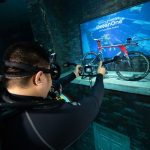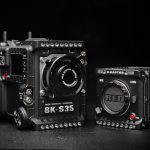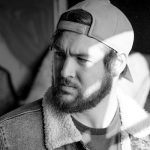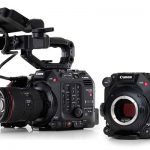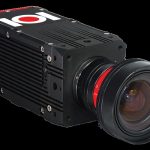With his debut feature film "Camera" garnering positive reviews and awards, Emirati filmmaker Abdullah Aljunaibi speaks about his ambitions to make Arab films with universal appeal.
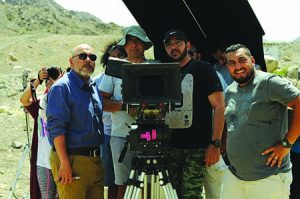
With his debut feature film Camera garnering positive reviews and awards, Emirati filmmaker Abdullah Aljunaibi speaks to Supriya Srinivas about his ambitions to make Arab films with universal appeal.
The film Camera remained a synopsis for 10 years as Emirati filmmaker Abdullah Aljunaibi knocked on the doors of government and private entities for financing. In early 2017, a chance meeting with a Dubai real estate developer, Dr Faisal Al Mousa of FAM Holdings, turned things around.
After 10 long years, it took just 10 minutes for me to explain the idea of Camera to him and for him to agree to offer $1 million. I left my full-time job as director for Dubai TV and started work on my first feature film.
Also read: DoP Hani Alsaadawi’s account of shooting in the Mleiha desert
Also read: The team from I AM WE Productions, on scoring the music and creating sound effects
Also read: Aji Idicula of Megamedia Films on post-production for Camera
Tapping into the mainstream genre of psychological thrillers, Camera revolves around a road trip among friends that turns into a bloody tale of survival.
Asked why he financed the movie, Dr Al Mousa says: The movie industry in the UAE is still very young, with no sustainable model for production. The country offers all the infrastructure from technology and studios to local talent, so why not make movies? Movie-making is big business around the world and we want to be leaders in this industry.
For Camera to be part of the Muhr Awards at the 2017 Dubai International Film Festival (DIFF), Aljunaibi had to complete the movie at a punishing pace. I took a month to prepare my actors. I finished the shoot in 21 days in April and took three months for post-production, he recounts.

The harsh shooting conditions in the desert and the rigours of 24/7 post-production paid off as he walked up to applause to receive the Muhr award for Best Emirati Director at DIFF 2017. When a fatigued but happy Aljunaibi spoke to BroadcastPro ME on the sidelines of the festival, he said he spent most of the $1 million on equipment, makeup and post-production. His no-compromise approach to quality has paid further dividends, with Camera poised for commercial release Gulf-wide.
I got top-of-the-class equipment from one of Dubais largest cinema equipment rental houses, Gamma Engineering. I respect the audience that takes the trouble to travel to the cinema halls and pay for a cinema ticket. I am happy to say this is one of the few Arabic films with cinematic quality of international standards.
We had three big trucks of equipment from Gamma Engineering. For the three days that we shot the racing scenes in the desert, we had the camera and other equipment fixed onto a buggy-like vehicle that cost $10,000 a day to rent.
Aljunaibis Director of Photography, Hani Alsaadawi, describes that particular shot in detail and the rigorous production shoot that spanned 21 days (see box: Shooting in the Mleiha desert).
Aljunaibis exacting standards extended to sound as well: Every single sound you hear in the film was dubbed. While sound on the set was recorded for reference, every sound from the cut of a knife to a step in the desert was created in the studio. This was a practical decision as well, considering I could not control natural elements or an overhead plane during a shoot in the mountains and the desert. It helped speed up shooting as well, because 70% of retakes are generally because of faulty sound recording.
Music composer Marcel Lteif and sound designer Gerrit Genis from Dubai production house I Am We Productions describe the challenges of creating every sound and scoring the music for Camera (see box: How we created sound and music for Camera).
The demanding approach to production was matched by an extraordinary urge to tell a story that began when a teenage Aljunaibi watched Bollywood films in an open-air theatre in Abu Dhabi.
I was driving a taxi to support my family and would watch Bollywood films while I waited to ferry audience members home. From Amjad Khan to Amitabh Bachchan, I have watched every film of the 1970s and I soon began to feel the urge to weave my own stories into films.
A chance opportunity to be part of a production team for a Jordanian art director allowed the boy who loved movies to become the man who creates movies.
While I have directed more than 3,000 hours of events for Dubai TV, including the opening and closing ceremonies of previous editions of DIFF, Camera is my first feature film. I had made six shorts prior to this film.
Described as a psychological thriller, Camera is about a group of friends who discover an abandoned mobile phone in the desert, let their curiosity get the best of them and play what the camera recorded. It shows another group going on a road trip that quickly turns into a bloody tale of survival.
A Screen International review gives Aljunaibi the thumbs-up for his debut feature: Violent Emirati genre films tend to be thin on the ground Abdullah Aljunaibis debut feature film Camera is punctuated by some nicely stylised moments of tension and violence and makes impressive use of its desert locations. Lushly produced, the film is a bold attempt to tap into a mainstream genre.
 Filmmaking is not just about the art for Aljunaibi, it is a mission, he asserts:
Filmmaking is not just about the art for Aljunaibi, it is a mission, he asserts:
Camera is about youth finding a sense of direction and purpose.
The three official hats of director, actor and mentor of fresh new actors sit lightly on Aljunaibi. He won the Best Director Award at DIFF for his 2012 short film The Path, and as an actor, he appeared in Tobe Hoopers 2013 UAE-shot horror film Djinn. He believes mentoring new actors is intrinsic to his mission to help build a viable film industry in the UAE, and that Emirati filmmakers are held back by the three red lines of sex, religion and politics.
I will respect you if you cross that line, but you need to prove to me that it is justified and that it makes your movie stronger.
As director, he believes in teamwork.
I dont know everything. I have the vision and the idea, and then I leave everything to the right person. My DoP Hani is incredibly talented. He was like my eyes, translating my vision to reality. A lot of credit of bringing Camera to life goes to him. My audio directors Marcel and Gerrit showed me that when you work hard, you get a great product and lastly, I have to thank Dr Faisal. Building towers is simple, helping build a society is tough.
The film went 85% over budget, with Aljunaibi having to put in an additional $850,000 to complete it, and the process did bring a bit of tension to the Aljunaibi household. But it was worth it, he said.
When my wife watched the screening at DIFF and experienced the overwhelming response from the audience, her smile of appreciation was my biggest reward.
Other than a Gulf-wide release, Aljunaibi will be getting the film dubbed into Tamil, Urdu, German and Dutch and release it in India, Germany and the Netherlands. With an ambition to make 10 features in the next five years, Aljunaibi is keen to make Arab films with an international appeal.
I am not interested in making a film about an Emirati camel rider and his problems. Just as the theme of Camera is universal, I am keen on making Arab films that will find universal appeal. I saw that clearly at the DIFF screening where I had an international audience relate to the film. –
Shooting in the Mleiha desert

Director of Photography Hani Alsaadawi is a veteran of many Egyptian drama series and movies. Camera is his second feature film in the UAE. He describes the shoot.
We had two cameras on set. Cameras generally have issues with heat, and we were shooting in April. We chose the RED Dragon. We faced no issues. I was happy with the results, because I had the full 4K resolution and I had the space for colour grading and colour correction.
It was a tough terrain. For the racing scene in the desert, we had a flight head with shock absorber. This was all mounted on a 4-by-4 buggy, and we remotely controlled the cameras. The driver was of course a professional key grip who knew exactly how to move. Everything from zooming, head tilting and panning was done remotely. The camera being relatively lightweight helped, because we had mounted a big zoom lens.
The shoot was tough for the crew. Each time we had to change positions or climb dunes, it took time and effort, shooting as we were in April with daytime temperatures often touching 50 degrees. During my month-long technical recce, I had decided on my shooting schedule based on the conditions. The call time for crew and equipment was 4am and we would start the shoot at 7-7:30am. With the sun disappearing even faster behind the mountains, our shoots were restricted to around 5:30pm in the evening. I used reflectors and butterflies to control the lighting.
We shot in the Mleiha desert in Sharjah for seven days and a mountain area in Ras al Khaimah for seven days. It was a privilege to be part of a mission to create a film industry in this country. –
How we created sound and music for Camera
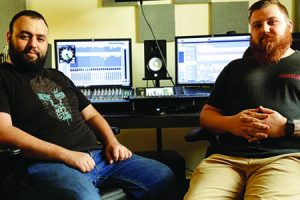
Marcel Lteif, CEO and co-founder of Dubai-based I AM WE Productions, composed the music for Camera. His colleague Gerrit Genis did the sound design. Lteif spoke to BroadcastPro ME about their work.
Every sound you hear in Camera was created by us. Sound was captured by the crew for our reference. We generally try to create sounds that would be unique to the project at hand. We believe in challenging ourselves, and we dont prefer using libraries.
We used a combination of Nuendo and Pro Tools. We also had a Yamaha Nuage mixer. Among the most challenging sounds was the hitting scene, where a character is hitting another with a rock. We played with silence, and the sound created needed to be hurtful. What you hear is a range of 10-15 sounds layered to create that effect.
While the dubbing was not done in our studio, it was polished in terms of syncing, mixing and so on.
I did the music composition using Cubase 9.5, while Gerrit did the sound design.
For this movie, there were two specific timelines. One related to the past when the killing took place that the protagonists watch on the phone, and the second timeline was the present. While we kept the present ambient-driven, playing on silence, the past was tension-driven. Given the genre of the movie, our music was based on creative tension for instance, for the villain we created an ominous aura through the use of Shepard tones with an endless loop of a screeching sound.
Given the tight schedule, I would sketch the music as soon as I would get an edit. Both Gerrit and I kept challenging each other, and hopefully, we made the movie better. –
Post-production for Camera

Post-production manager Aji Idicula of Megamedia Films, with offices in Dubai, Oman and India, gives an overview.
We worked with Avid DS, Nuke, Smoke and Flame Premium in post-production for this film. Camera was a true challenge for all our technicians. Deserts are among the most dramatic landscapes in the world. With the movie being predominantly set in the desert, our colouring artist successfully translated director Abdullah Aljunaibis vision by providing two patterns of grading and feel to the film. Our graphics and VFX team helped elevate the drama in the action scenes.









































































